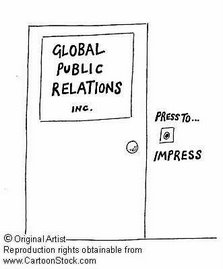Online PR and the Future of On-line PR
 Online public relations is known to be a rather new sector in the field of PR, even though PR has existed for as long as there was humans on this earth. Of course at that time PR was only used to sell peoples skills and their services. Brian Cooper the director of online PR at Medium Blue said, that we can look at the examples of cavemen who painted their haunting skills to sell their services to people in that era or time, even though it wasn't called PR at that time but they were still using it to sell their skilled services such as haunting, spear throwing, etc.
Online public relations is known to be a rather new sector in the field of PR, even though PR has existed for as long as there was humans on this earth. Of course at that time PR was only used to sell peoples skills and their services. Brian Cooper the director of online PR at Medium Blue said, that we can look at the examples of cavemen who painted their haunting skills to sell their services to people in that era or time, even though it wasn't called PR at that time but they were still using it to sell their skilled services such as haunting, spear throwing, etc.
Looking at what the Internet has done for us today we should begin by looking at the different fields of study such as science, the media, engineering, etc. What the Internet has really done is enable many fields to progress, but especially looking at the field of PR we can see that it has benefited and progressed a lot from this new technological advancement. The Internet has helped traditional media and the new media emerge together slowly, to create new forms of communication which is called today the New Media. Examples of this new media are Blogs, online newsletters, podcasts, online press releases, etc. 
According to Brian Cooper, he states in his Blog on "Online PR and Marketing: Strategies for Internet Visibility", that press releases haven't changed much over the years even though now you can find them online compared to the past, but the differences is in the way in which its being distributed and how the media and the public can find those press releases.
The benefits that Online PR has compared to traditional PR (traditional print media), is that it's able to reach out to a wider audience in a short period of time if not even instantly, to the public and also to local and international media outlets.
Now looking at online newsletters. Online newsletters usually contain both some advertising and information content. The things that we can usually see included in these newsletters are; articles, information about sales and promotions, news alerts, and surveys. This PR strategy has an advantage thats why its also quite a popular new strategy, the advantage it has is that it can be created very quickly and it can also be distributed very quickly and directly to the people who are asking for it, like clients, potential clients, etc, basically it will only be spread to people who are interested in it.
While looking at Blogs. Blogs are like an online dairy or journal that if written for a company it’s actually written by the company’s executive, but in most cases Blogs are written by people who want instant feedback on what they have to say like some kind of an issue, topic, etc. Blogs communicate the writer's opinion about the industry or the company or even any issue that the writer wants to talk about. The benefits of having a Blog is that it helps create informal communication between the company, organisation and it's clients or potential clients, it basically gives the company or organisation a face not just a name or brand and the same goes for the writer of the Blog and it’s viewers.
What I believe as technology evolves, the future of online PR will become more and more sophisticated, it will involve Podcasts and maybe some other new features which we might have not heard of yet. I actually recently heard that there were some companies who already use Podcast as there online PR strategies. Podcast is one of the newest online PR strategies. Podcasts are used today mainly by independent radio programs, but also large media corporations are trying to use it to distribute advertisement.







7 comments:
It seems that we are all fascinated with "new media" and PR, or actually where does PR stand in the new era. As you mentioned in your blog, forms which PR practitioners like press releases are changing, and we must question ourselves where is the solution in balancing traditional methods with the ones that are upcoming.
Hey Lina!
It's quite interesting to watch the development of new media and it will be even more interesting to see how it will all turn out in years time. While i agree with you that all of these new forms have considerable benefits for the PR industry, and PR students should indeed familiarize themselves with the new technology, i find that we should be cautious not to overstimate the impact. Are new media really going to revolutionize the PR field? It's hard to tell at this stage, but let's face it, most of us still tend to mostly consume (and trust!) traditional media more than we do blogs. In fact, so far at least, old media are still alive and kicking! And direct communication is, of course, excellent, but after the initial hype has faded, will audiences still be that interested in and trusting of blogs? Look what's now happening with the whole flogging practice. After all, the whole point of journalists is being gatekeepers of information and separating reliable, unbiased information from the rest.
I very much agree with Alena, I think that the “new media debate” is slightly exaggerated. In fact, to be honest, I am really tired of the whole debate. New media has without doubt created a whole range of new ways to communicate - new tools for PRPs, however, in my view, it does not mean that it will change or revolutionize the whole practice of PR. I think that every “technological revolution” has propelled a debate about what will happen with the “old way” of doing things. Looking back, when the TV came, everyone thought that the radio would disappear… When the internet was created people thought that we would start reading novels off the internet…. What is evident is that new technology offers new ways to communicate and new ways to consume different media, however, we still communicate like we did in the “old” days and we still listen to radio. This fact, I think, applies very much to the PR practice as well. New technology does perhaps change the way PR is practiced however, I bet that PRPs will continue using the same old methods that they have always used.
Hi Lina!
I always find this debate regarding PR and the new media interesting. It seems to me that PR practitioners will eventually adapt to new new media, especially if university programmes are teaching them about it. The internet allows companies to communicate directly with their audiences which is important. If you look at charities and NGOs use of the internet it is clear that they have successfully used new media in numerous ways. They can spread their messages very quickly and it allows them to lobby in both creative and cheap ways. Our speaker in class on Wed. proved that the internet is a great pr tool if it is used correctly.
I think that everyone, not only PR practitioners have benefited from new media. If you look online at many company websites, there are electronic press releases, which are available to everyone. In the days where everything was sent through the post, it was only the journalists that received press releases. If I was not a journalist, I would have had to specifically request a press release.
I think that new media has revolutionized the industry through making information easily attainable and at a faster rate.
I wonder what next after Podcast? There has been a lot of excitement in the gaming world over Second Life and Spore, the latest offering from the Sims creator. Would talking about news worthy issues now take on a new platform? Yet the fact remains, PR done the old way will still remain - it doesnt matter whatever way you handle PR, at the end of the day its about being creative.
I agree with Ida, the debate over new media is constantly being brought up and it's no longer new media at that point.
Podcasts are already falling line with the other misunderstood new media genres. Companies are spending time and money to create these podcasts that may or may not be effectively reaching their target market. I hope that more research is being done in the corporate world before putting out podcasts.
Post a Comment